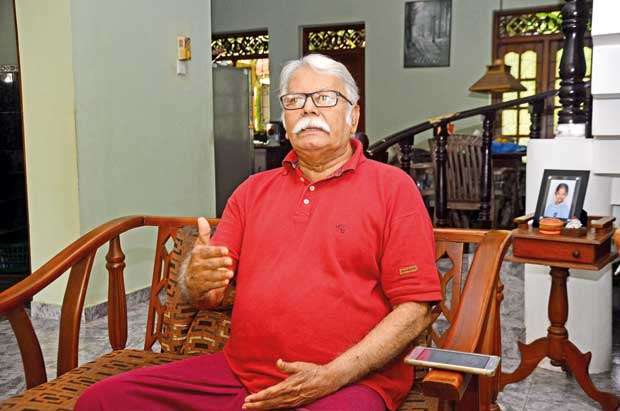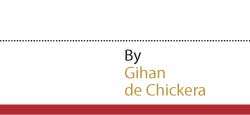06 Dec 2018 - {{hitsCtrl.values.hits}}

 This year marks the 50th anniversary of formation of the the Revolutionary Communist League (RCL) of Sri Lanka in 1968. The RCL functions as the Sri Lankan section of the International Committee of the Fourth International (ICFI), and was renamed the Socialist Equality Party (SEP) in 1996.
This year marks the 50th anniversary of formation of the the Revolutionary Communist League (RCL) of Sri Lanka in 1968. The RCL functions as the Sri Lankan section of the International Committee of the Fourth International (ICFI), and was renamed the Socialist Equality Party (SEP) in 1996.
Daily Mirror spoke to Mr. Wije Dias, the General Secretary of the SEP, on a series of issues, including the foundations and principles of the RCL and SEP, the ongoing political crisis in Sri Lanka, and the challenges of uniting the working class across international lines to build a socialist alternative to the current capitalist system.
Q This year marks the 50th anniversary of the Revolutionary Communist League (RCL) established in 1968, and later the Socialist Equality Party (SEP). What were the reasons for the formation of the RCL and SEP?
I was a founding member of the RCL in 1968. Initially we were in the LSSP youth leagues when it joined the Sirimavo Bandaranaike coalition in 1964. We were keen to fight capitalism - politically, economically, administratively, and culturally. But by joining the coalition, the LSSP had committed itself to sustaining this degenerating system.
The LSSP (R) faction, or Revolutionary, led by Edmund Samarakkody, opposed the coalition. We transferred our allegiance to them. But we soon discovered that they were also following the same line of class compromise as the LSSP.
At the Peradeniya University library we came across the newsletter of the British section of the International Committee of the Fourth International (ICFI), led by Gerry Healy. We read Healy’s pamphlet, “Ceylon - the great betrayal”, and a significant sentence in it was: “The origins of the coalition cannot be found in Colombo, but only in Paris”. Paris was the headquarters of the International Secretariat of the Fourth International (FI), which was dominated by Pabloites.It was their politics that had guided the LSSP into the coalition. And the LSSP (R) leaders opposed discussing this issue because they wanted to follow the same Pabloite line.
We then broke away from the LSSP (R) and formed the ‘Shakthi’ group. In 1966-67,we were introduced to comrade Wilfred ‘Spike’ Pereira,who encouraged us to continue our work in line with the ICFI. He insisted that we study the history of the FI. We discovered there had been a split between 1961-63,when the founding leader of the ICFI and US Socialist Workers’Party leader Joseph Hanson had joined the Pabloites. We read many documents to understand the political issues involving such splits. It is on this basis that we formed the RCL in 1968.
This period was also a watershed in the global class struggle. The French general strike of 1968 forced de Gaulle out of power. In the UK, PM Edward Heath’s Conservative Government was ousted.The dictatorships of Caetano in Portugal and and Franco in Spain were brought down.The climax was in 1975, when the mightiest imperialist military was defeated in Vietnam.
After the Second World War, the world capitalist system had to be regenerated on the strength of the US economy
Q You mentioned Pabloite revisionism. The SEP is a Trotskyist party. What is the difference between Trotskyism and Pabloism?
Pabloism originated in the Trotskyist movement after the end of the Second World War (WW2). After the war, the world capitalist system had to be regenerated on the strength of the US economy. Projects like the ‘Marshal Plan’ helped rebuild Europe. The IMF and WB granted easy loans to capitalist states,which gave concessions to workers whenever they struggled for better social conditions.
India and Sri Lanka got independence under a parliamentary form of government. The Bolshevik Leninist Party of India (BLPI), which included India, Sri Lanka and Burma, split into three, and accepted the parliamentary system.They retreated from the revolutionary politics of the FI, and adapted to a reformist line, which led to the emergence of Pabloism.
Q Was this reformist line set within national boundaries, or did it have an international perspective?
They revised the international perspective within national boundaries. Trotsky established the FI against Stalinism and Social Democracy to develop an alternative revolutionary leadership for the world working class. The Pabloites revised this in relation to Stalinism.
After WW2 Europe was divided into two. Eastern Europe was dominated by Stalinist regimes, and Western Europe was dominated by the US.
The Pabloites argued there would be no independent revolutionary movement of the working class. They said the main contradiction was not between imperialism and the world working class, but between imperialism and Stalinism.
So Pabloism was an adaptation to the post-war settlement between imperialism and Stalinism, and to the parliamentary system established in the colonial countries, giving room for nationalist movements to emerge.
Q How did these changes affect Sri Lanka?
The BLPI initially opposed parliamentary politics and characterised it as a “conspiracy against the people”. They opposed independence and called it “fake”. They said for real independence, the working class must unite and overthrow capitalist rule. But they gradually adapted to the post-war independence settlement.
Q How did Keerthi Balasuriya, the first General Secretary of the RCL, help develop an internationalist, revolutionary perspective into the movement, especially within the context of Sri Lanka?
Keerthi Balasuriya was the youngest among us, and was still schooling when he joined the ‘Shakthi’ group. Among us, he gained the best grasp of the lessons of the theoretical and political struggles of the FI. So when we formed the RCL he was elected as General Secretary.
He waged a struggle against the revisionism of the LSSP (R) and the syndicalist tendencies of trade unions. He was a brilliant student of politics and he guided the party until his untimely death in 1987.
Q Regarding Trade Unions (TUs), the SEP is a strong critic of Trade Unionism.
Yes.
Q TUs can be politicised and corrupt in many cases. But what do you feel about the coming together of Trade Unionism and revolutionary politics?
Trade Unionism is bourgeois politics. It’s capitalist politics. It fights for workers rights within the framework of capitalism. Lenin’s 1902 pamphlet ‘What is to be done’ fights against the current of ‘Economism’ - which was Trade Unionism. He says Trade Unionism can only develop bourgeois consciousnesses, or capitalist consciousness, within the working class. Therefore revolutionary Marxist politics has to be brought into the working class, through a revolutionary party.
Q So does this mean the working class is not inherently revolutionary?
Objectively it is the revolutionary class. But there is a gap between revolutionary consciousness and revolutionary class activity. Revolutionary consciousness must be introduced into this objectively revolutionary social force. According to Marxism, the revolutionary consciousness doesn’t come automatically from the working class. By itself, the working class could spontaneously develop only the bourgeois consciousness of Trade Unionism, and make demands from their employers.
The world capitalist economy is facing a greater crisis than during the 1929 Wall-Street crash
Q How can the working class go beyond making economic demands?
That also can happen automatically. Trade Unionism developed to have a controlled form of agitation under the bourgeois state. When employers refuse workers’ demands, workers’ appeal to the state. TUs bring pressure on capitalist governments to answer the problems of employers and the working class. They don’t want to overthrow the state, but instead make appeals for favour and support to win their demands.
Revolutionary politics begins with a perspective of overthrowing the capitalist government and establishing a workers’ and peasants government. These political perspectives can only be introduced by a revolutionary Marxist movement. It doesn’t automatically and spontaneously come out of working class struggles.
Q Organizing the working class has many challenges. In Sri Lanka almost two-thirds of workers are in the informal sector. How can such workers be organized? How would you approach that challenge?
Take farmers for instance. That’s an informal sector of economic activity. They produce for the market, work by themselves, buy products, transfer their produce into money,and make more agricultural produce. This informal system later develops as a formal sector, and workers organize around it.
Hotel workers form organizations. So do professionals like the GMOA. The IT sector is a growing informal sector.But the fundamentals have not changed. Workers are being exploited by the investors of capital in their sectors.
Q But those are more privileged workers. I’m talking about more vulnerable groups like domestic workers or migrant workers.
Plantation workers started as immigrant workers, but they formed unions and became one of the most powerful sectors of the organized working class. These things happen automatically.
 But TUs are so discredited that people don’t like to join unions.They recognise that the leadership is working for employers, and for the TU bureaucracy. Even in the plantations,enrolment is decreasing.
But TUs are so discredited that people don’t like to join unions.They recognise that the leadership is working for employers, and for the TU bureaucracy. Even in the plantations,enrolment is decreasing.
That’s why we made some policy changes in the 1990s regarding the national question and TUs. The dissolution of the Soviet Union (SU) exposed the bankruptcy and reactionary nature of nationalist programmes.
The leaders of the 1917 revolution had an internationalist socialist perspective. But when Stalin assumed leadership in 1923-24, he developed the theory of socialism in one country. Trotsky opposed this. But Stalinism developed as the main nationalist tendency within the working class.
With the dissolution of the SU, the Stalinist bureaucracy admitted they could no longer develop their perspective. If a vast country like the SU could not sustain itself on a nationalist programme,how can small nationalist separatists sustain themselves?
So we gave up the traditional Marxist demand to the right of self-determination. We support every democratic demand of the oppressed minorities, but insist on the unity of the working class between the oppressed people and the oppressor people. We fight for a socialist solution to resolve the deprived democratic rights of the oppressed people. That’s the programme we develop.
Regarding TUs, we previously fought within TUs, to win over the leadership to the Marxist revolutionary party. But now we propose to build alternative organisations to TUs called workers’ Action Committees (ACs). These ACs function like soviets. The supreme soviet is the legislative council which elects an executive. We had that organizational structure under Lenin and Trotsky. We want to establish ACs and develop an alternative political perspective to capture power from the hands of the capitalists.
Q Regarding self determination, Tamil nationalist groups make the argument of historical, cultural and linguistic rights. Are those not valid arguments?
As demands they are valid. Their linguistic and cultural rights are suppressed. Sinhala was made the only official language to suppress Tamil. The privileges given to Buddhism goes against Hinduism, Islam and Christianity. As Marxists and materialists we don’t believe in religion.But those who believe must have the right to practice their religion. We defend that right.
We fight against all forms of oppression. But we insist that it is through a socialist transformation of society that these rights can be exercised and achieved. For that we have to join together, cutting across national, racial, linguistic and religious divisions.
We support every democratic demand of the oppressed minorities, but insist on the unity of the working class
Q According to the SEP, what are the global factors that have contributed to the ongoing political crisis in Sri Lanka?
The effects of international changes are reflected in this crisis. The world capitalist economy is facing a greater crisis than during the 1929 Wall-Street crash. The development of Russia and China as capitalist countries has antagonised established imperialist countries. US imperialism, which is seeking to maintain world domination, is aiming for an aggressive militaristic policy against Russia and China. Sri Lanka, being in a strategically important location, is very much involved in these disputes.
Mahinda Rajapaksa wanted money and equipment for the war. The West couldn’t respond to this, but China gave lavish loans. After the war,China provided more loans for so-called development projects. This antagonised the US. They wanted regime change, and got their chance when Rajapaksa declared an early presidential election.They hurriedly organized through Chandrika Bandaranaike Kumaratunga and the Clinton Foundation to bring Rajapaksa’s party secretary as the common candidate.
But the new Sirisena-Wickremesinghe government was restricted because they could not approach China as Rajapaksa had. With a crisis of investments and aid linked to heavy conditions, the masses got restless and rebellious.
The class struggle was developing in the latter years of the Rajapaksa regime as well. The FTZ workers protested the Bill to remove their EPF rights, and worker Roshan Chanaka was killed by the police. The following year fishermen protested rising fuel prices, and Anthony Warnakulasooriya was killed. In 2013 the people and workers of Rathupaswala demanded drinking water,and the military killed three persons.
This development of class struggle didn’t abate after the Sirisena-Wickremesinghe government was established. There were just a handful of days without some agitation or other, somewhere in the country. The rupee was depreciating, exports were collapsing and aid was drying up. Sirisena and Wickremesinghe couldn’t continue as they had planned. So Sirisena got the support of the Rajapaksa clan and Wickremesinghe placed his hopes on the support of Trump, May, Macron, Merkel and Modi.
The SEP sees this not just as a crisis between two factions of the capitalist class, but also as a crisis of the parliamentary system itself. The form is parliamentary, but the content is the crisis of bourgeois rule. There are differences in the form and content of everything. The 2008 breakdown took the form of a financial crisis, but the content was the entire capitalist economy.
What must be replaced is the parliamentary system of rule and the capitalist state itself. And it must be transformed into a workers and peasants state based on ACs. That is how we explain this crisis. And that is the proposal we make to the people to get ready for.
Q We hear the common refrain that achieving international socialism through uniting the working class across racial, religious, linguistic and national boundaries, is not practical. And instead, what is needed is periods of transition, or critical support for non-working class governments. What is your response to this?
The two words “critical support” is itself a fraud (laughs). Either you support or you oppose. However much you criticize this government, nobody is there to listen. It’s not for a lack of criticism that Sirisena is acting as he is now. Even if he doesn’t read the papers but goes through the cartoons, he would realise the people don’t like him. Sirisena has to find an alternative. But the won’t do so in the way we think, but in the way a capitalist ruler thinks. The change he expects is within this system. Therefore he replaced Wickremesinghe with Rajapaksa.
Q But my question is how do you respond to idea that the unification of the world working class across dividing lines is not practical?
That’s a response of lazy minds (laughs). Where has the scientific Marxist experiment been made to say it’s not practical?
Trotsky established the Fourth International to develop an alternative revolutionary leadership for the world working class
Q Didn’t that experiment take place in 1917 in Russia?
It happened.But it was short lived. It was disoriented. That’s why Trotsky took the initiative to build a left opposition within the Bolshevik party. He wanted to get rid of the Stalinist bureaucracy, and reform the Bolshevik party, and the Third International. He tried for ten years until 1933.
He explained that the bourgeois class in the decay of imperialism couldn’t perform progressive tasks. Therefore the revolutionary class has to act independently. If the revolutionary class aligns with the bourgeoisie it blunts the weapons of the revolutionary class and mutes its aspirations.
The final punch was the experience of the German Communist Party. Trotsky advocated for a united front between the German Social Democratic party and the Communist Party to stop Hitler from assuming power. That call was ignored and Hitler took power in 1933. Then Trotsky decided against reforming these parties, as they were dead as far as the revolution was concerned. So he built an alternative international and founded the FI in 1938. The SEP is the representative of this in Sri Lanka.
Q What is the role of the SEP in Sri Lanka to galvanise the working class in the larger international context? Can a small working class in a small country exert much influence over global happenings?
The ICFI doesn’t consider the size of a country to recognise its political line. We are a fraternal organisation of all sections of the working class, whatever language, culture or nationality. We are fraternally in unity. We are equals, and we are fighting for social equality. We live in a small country, but we are a part of the world, no less than the US. There are global conditions under which we all live. The international unity of the working class must be achieved on a socialist basis to come out of this very dangerous situation, with a developing world war, right wing movements,and dictatorships all over the world.
10 Jan 2025 10 minute ago
10 Jan 2025 2 hours ago
10 Jan 2025 2 hours ago
10 Jan 2025 3 hours ago
10 Jan 2025 4 hours ago